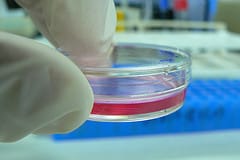Guest blogger Paul Gross is an emeritus professor of life sciences at the University of Virginia and former head of the Marine Biological Laboratory at Woods Hole.
Yesterday in Ed Week, an article by Nora Fleming highlighted the results from a recent NAEP assessment of “hands-on” science skills, which demonstrated that “elementary, middle, and high school students failed to demonstrate a deep understanding of science concepts when they performed activity-based science tasks and investigations…” This breathless account hardly merits close attention. The NAEP data will receive it in due course. But the remarks of the NAEP Governing Board’s spokesman, here quoted, are disturbing. They call for a response not much longer than statements quoted in Nora Fleming’s article.
 All scientific "situations" are "real life." Photo by Umberto Salvagnin. |
First, the comment attributed to Alan J. Friedman implies that, until now, K-12 science education has consisted of “rote memory and how to follow instructions.” Abandonment of this canard by science teachers (and their teachers) is long overdue. There is no evidence to support it. For half a century, specialists in school science and their professional organizations have stressed, and overstressed, the importance of “hands-on” science learning. That insistence antedates by decades the advent of computers. The suggestion that until now science education ignored the “grasping of concepts,” in favor of rote memorization, is false. All good science teaching and learning, in school and the early college years, is about concepts, and about their application in situations beyond the original locus of elaboration.
Second, whatever these lauded new tests assess, it is probably not “scientific reasoning.” There is no reasoning, scientific or otherwise, in the absence of knowledge. Scientific knowledge, moreover, always includes or is based on reasoning. Every major topic within K-12 science is a series of reasons—evidence and (only) the valid conclusions drawn from it. The reasons show why a particular rule, theory, or law about the physical world is correct—for now. Scientific reasoning is thinking hard about right and wrong answers or explanations. That’s why science is hard.
Third, all scientific “situations” are “real life.” Calculating the force necessary to life a weight, with and without the aid of block and tackle, is as real-life as you can get. Learning the facts from listening, reading, and observing in the lab—of the development of an animal from a fertilized egg—is exquisitely real life. It has been going on in science classes for a hundred years.
For reasons that escape me, the belief persists among school science educators that scientific reasoning is separable from the content of science, or worse, that the content of science is some form of skill, parallel to, but not to be confused with, knowledge and experience. The poor performance, on average, of our students in science assessments here and abroad is at least in part a consequence of such notions. With the rise of cognitive science, they should have been abandoned long ago.
